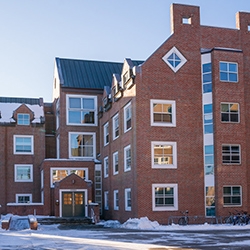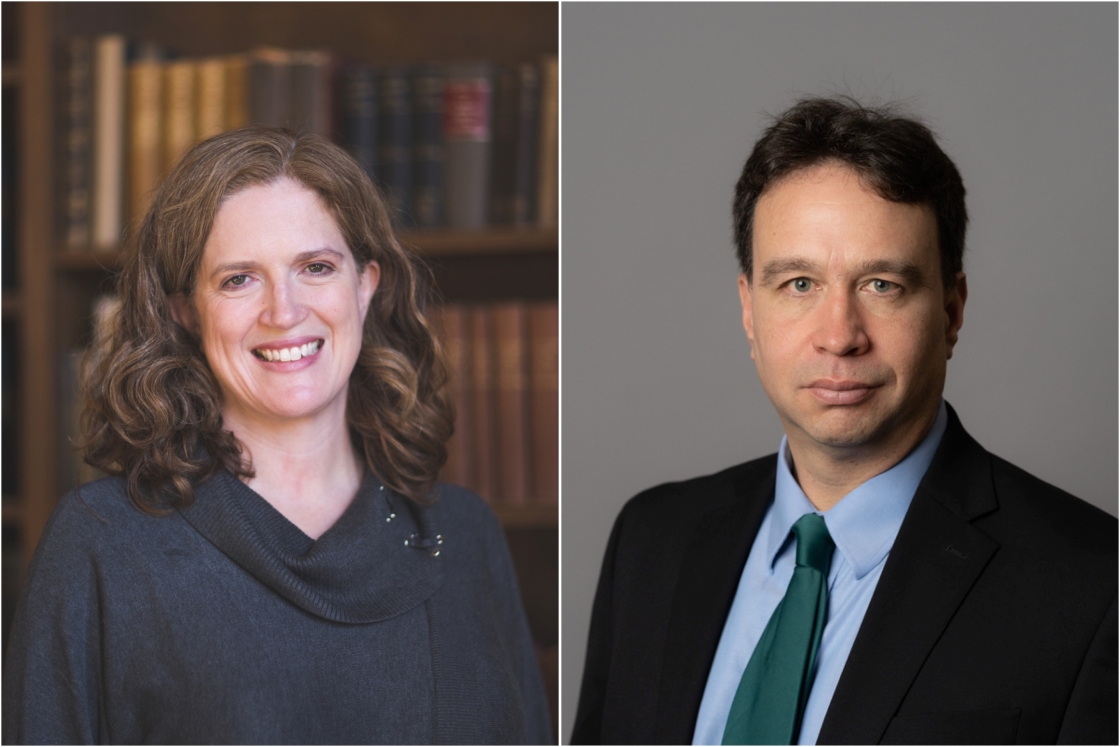Work on the Moving Dartmouth Forward plan has begun on many fronts, with the first milestones—the application deadline for new residential house professors and the institution of a ban on hard alcohol—coming up next month.
In addition, committees are working on other projects, including a new statement of community citizenship and an annual assessment of student organizations.

Many elements of the Moving Dartmouth Forward plan, outlined by President Phil Hanlon ’77 in a Jan. 29 address, center on the creation of a strong residential house system that will include six clusters of residence halls—called house communities—each with its own faculty member serving as a house professor for a four-year term.
“Our goal is to turn toward the things that make Dartmouth truly great,” says Provost Carolyn Dever. “We will work to nurture a community where students are engaged and at their very best. That’s our responsibility to them as faculty and staff.”
In addition to the house professor positions, there are opportunities for members of the Dartmouth community to be involved in other aspects of the Moving Dartmouth Forward plan, Dever says. Those interested in participating can email dean.of.the.college@Dartmouth.edu.
The Office of Judicial Affairs is working with campus partners to develop rules and sanctions related to the hard-alcohol ban for undergraduate students, which goes into effect March 28, the first day students can return to campus for spring term. Here is a look at other work that is under way:
Strengthening the Residential Experience
A cornerstone of President Hanlon’s plan is the transformation of residential life. Beginning in the fall of 2016, the College’s residential facilities will become house communities characterized by academic and community engagement and continuity. Led by house professors, these communities will work to inspire a lifelong sense of identity and belonging, support a variety of options for community-building and social interaction, and promote positive and lasting connections with faculty, graduate and professional students, staff, and alumni. Unlike the current residential system, house communities will become a base for students throughout their undergraduate years.
Read More About the Plan:Undergraduates will be randomly assigned as members of a house community. Each community will be made up of a set of residence halls that will serve as a home base and be home to up to 700 students, approximately half of whom will be in residence during any given term.
First-year students will continue to live in designated first-year residence halls to foster bonding and the transition to college life. As students move into their sophomore year, they will live within their house community unless they choose to live in residential affinity programs, living-learning communities, Greek houses, or off campus. No matter where they live, house members will be able to participate in all of their house community’s programs.
Student governance leaders in each house will partner with house professors to develop activities including house meals, intramurals, concerts, field trips, events with house alumni and other community members, and experiential learning and leadership-development opportunities.
“Our first house professors will have a wonderful opportunity to be part of developing distinctive house identities that will define their communities in the years ahead,” says Interim Dean of the College Inge-Lise Ameer, who, with Dever, is leading the house professor recruitment process.
House professors will begin living in college-owned residences near their house communities in the summer of 2016. Staff members are working on details related to the makeup of the house communities and location of faculty housing.
The first meeting of the house system student advisory board took place this week. “We have a great group of students working with us,” Ameer says.
Promoting a Healthy Campus Environment
In addition to the ban on hard alcohol, a social event and alcohol management working group, chaired by Assistant Dean of the College Kristi Clemens and Taylor Watson ’16, will soon begin reviewing and revising policies and expectations. Clemens and Watson are filling out the committee membership from a pool of applicants.
Undergraduate advisers in residence halls will continue to assist when students need medical help, ask students to dispose of alcohol if it is found in their possession, and report violations. The residential life staff is working to expand the practice of walking through residence halls more frequently, instead of only during traditional College celebration weekends.
Another committee, the student organization standards and review working group, is chaired by Anna Hall, director of student activities for the Collis Center for Student Involvement, and Sam Waltemeyer, assistant director of Greek Letter Organizations and Societies. This group will develop standards and expectations for all student groups, which will be used in an annual assessment of each organization’s contribution to the Dartmouth community.
Sexual Violence Prevention and Response
The planning and development of a four-year sexual violence prevention and education program for students and an online sexual consent manual are under way, coordinated by Heather Lindkvist, Dartmouth’s Title IX coordinator and Clery Act compliance officer.
The College is also in talks to have a WISE of the Upper Valley advocate located at Dartmouth. WISE is a regional advocacy and crisis services center for those affected by domestic or sexual violence. WISE staff would provide confidential counseling for victims of sexual violence, gender-based harassment, dating and domestic violence, and stalking.
Other Moving Dartmouth Forward Initiatives
- A community citizenship working group chaired by Director of Judicial Affairs Leigh Remy and Professor of Computer Science Thomas Cormen will develop a statement of community values and expectations related to civility, dignity, diversity, community, and safety, which all students will be required to sign.
- Roger Woolsey, director and senior assistant dean of Dartmouth’s Center for Professional Development, will lead work on the Aspen Institute’s Franklin Project at Dartmouth, a program that helps students find resources and sites for gap-year projects.
- Two surveys will be conducted on campus in the coming year. The Association of American Universities sexual assault survey of all undergraduate and graduate students will be conducted in April. A Dartmouth-specific campus climate survey of all students, faculty, and staff will be conducted next fall. Data from the two surveys will be made public.

